Deerhof - Interview
by Jamie Rowland
published: 18 / 3 / 2006
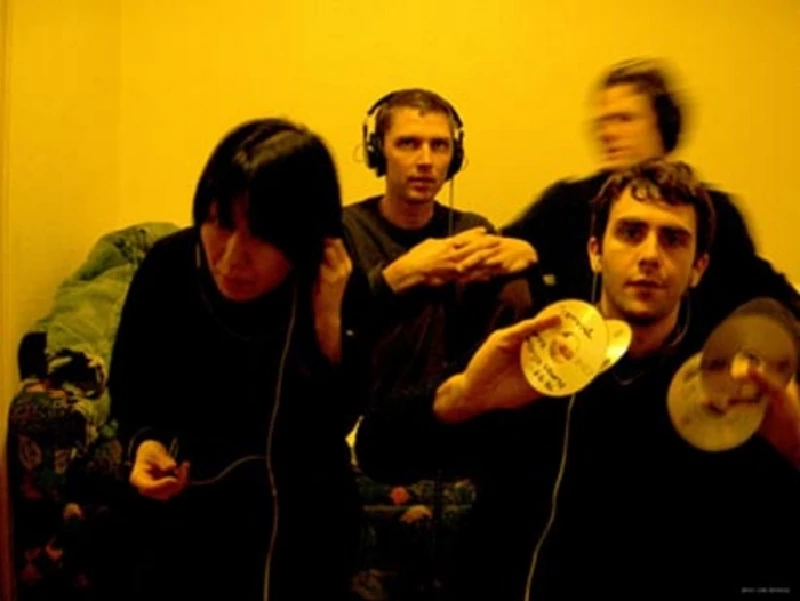
intro
Experimental San Francisco art rockers Deerhoof recently played a show in an European tour at the London Scala. Jamie Rowland chats to drummer and founder Greg Saunier about the band's origins and new long player 'The Runners Four'
San Francisco’s Deerhoof are one of the most unique and interesting bands around today. Ranging in sound from Sonic Youth-style post-rock to 60’s garage to J-pop, they’re certainly a band for people with eclectic tastes. Having started as a two-piece in 1994, the band have been going for around 12 years, and have released 7 albums and a number of EPs and singles. Last year saw the release of their seventh album, ‘The Runners Four’, and them also play a set at the Slint curated ATP festival and a world-wide tour. At the end of March this year Deerhoof, aka drummer Greg Saunier, vocalist and bassist Satomi Matsuzaki and guitarists John Dietrich and Chris Cohen, came over to the UK to perform a one-off show at London’s the Scala. I met up with Greg in Deerhoof’s dressing room back-stage to talk about the band’s music, origins, and their plans for the future. PB : Last year, you released ‘The Runners Four’. It’s a lot longer than your previous albums; was this a decision that you made before you started recording, or something that occurred naturally? GS : No, it wasn’t natural. We decided before-hand. Sometimes we try to think of things that we’ve never done before. For us, it was a little bit more than just “oh, we have to make twice as much music”. It was also like, when any band makes a shorter album, or like, the one that came out before 'The Runners Four' was an EP, it was only 15 minutes long, you know… I feel like Deerhoof has always attempted to pull out all the stops right at the beginning of something; so you put the CD on, and it’s just like full blast, right away, you know, relying a lot on big sounds or surprising sounds, that kind of thing. And we started to realise that we’d done that a lot, and we said to ourselves if we try and make a long album this time, we can’t do that, because it only works for so long, I mean, you can’t still be surprised. We figured we had to figure out a different pace for it. It was really fun trying to do it; I don’t know whether it worked, but it was neat to try thinking about it in a different way. PB : I think it’s worked very well; the album’s pace is very up and down. GS : OK, thank you! PB : Your songs seem to go all over the place in terms of musical style. What are your influences musically? GS : That’s a good question, I mean, I’m not sure I even really know. This was the first time, I think, ever in the band that we actually sat down and even started asking that question of each other before working on something. Normally, we don’t even have any concern over, like, “ok, what’s the influence going to be?” or “what’s your influence?” or whatever. This time we decided that we wanted it to sound like…well, I don’t know, there were a couple of things that I guess we agreed that we all liked, and that we were listening to at that time, but even that, I mean, it’s like it’s not really like it came out sounding like any of those things, so it’s almost silly for me to tell you what they are. I mean, do you play in a band or do you play music or anything? PB : I can sort of play the guitar… GS : Well, when you play the guitar, you aren’t a computer; you know what I’m saying? You can’t just input some influential data, and then it’ll spit out some music in the end that has adequately and properly been influenced by that input data. I mean, if I made up a song, I don’t even know, necessarily, where that came from. It wasn’t even necessarily a conscience effort to make the song. One way of answering the question would be to say that a big influence for us is whatever ideas come up unconsciously, without trying to push them. So, maybe a lot of ideas come from dreams, or come from half-awake things, or you find different ways of tricking yourself into coming up with ideas. Anyway, we don’t really agree on much music. We don’t necessarily like that much of the same music, but we all like many different kinds of music. We don’t really divide music up into categories in the way you’d normally see it in a record store, and I don’t think many people do. People don’t really put their enjoyment of music within those different boundaries. A lot of times I think that there’s the influences you want to say you have, to make you sound cool, but then there’s the influences you actually have, which is what you grew up with when you were 6 years old and first started listening to the radio and stuff, and you probably can’t even remember what it is! But, rest assured, if you figured out what it was, it wouldn’t be cool! I mean, I know that for me, I listened to a lot of light rock when I was growing up, because that’s what my mom put on the radio, and so that’s what I was always around, so there you go. That’s our main influence! PB : You also released an EP last year, ‘Green Cosmos’. Is it right that it was all in Japanese language? GS : Most of it was, yeah. PB : Was that something you’ve wanted to do for a long time? GS : That’s funny, that might be more of a question for Satomi. I think that it was something that I wanted Deerhoof to do for a long time, but Satomi didn’t want to do for a long time. Why was that? Satomi Matsuzaki : (Who recently entered the dressing room) Because nobody understands it. We usually play in many countries, and that only works in Japan. Actually, the label in Japan wanted to put out the EP, so why not? You know, Japanese label, so people understand! GS : I think it’s fun because, somebody singing in their native language is a little bit different from somebody singing in their second language, you know. It just has a different sound. So, sure, you can say that, ok, people in the US or in England understand our music more if we sing in English, but at the same time, maybe they understand it more if you sing in your native language. I think you could make a case for that being true too, because you can perform those words in a way that’s so authentic and so natural for you, and I think in a way that makes it more understandable too, or more direct. SM : I just didn’t want to make it corny, be like “I’m from Japan!” I’m not trying to say that. GS : Satomi sings in Spanish sometimes too. There’s some Spanish on that EP and there’s some Spanish on some other things. So that’s fun! PB : You perform all over the world; are there any countries where you get a better reception than others? You have quite a unique sound, and I was just wondering how well it translates to other countries and cultures. GS : Well, I don’t think it’d be fair for me to say, and there’s so many things that make me say that. One, there are some audiences that tend to be more, like when you’re playing, they yell more. They clap more. You get more of an obvious energy from the audience, and I would say England is like that for us. But at the same time, that doesn’t necessarily mean that when we play in Japan and the audiences are sometimes very quiet that they like it less, you know, I wouldn’t say that. And the other thing, is that it’s really hard to make a generalisation about an audience in any country, even though I just did! The thing is, ok, maybe generally, UK audiences are a little bit more noisy than Japanese audiences, but it’s not true for every person, you know? There’s obviously some people here, in London, that don’t make any sound during a show, and there are some people in Japan who make lots of sound. One of the things that’s been so cool to me, during the years of doing the band, is that I find that every single person has a different reaction to the band; when I talk to them at the show, or sometimes they’ll e-mail us, or something like that. Everyone seems to have a different thought about it, and some people are hearing this aspect of it, and some people are hearing a totally different aspect, or one person thinks it’s this genre and another person thinks it’s this opposite genre. I think the four of us, in the kind of music or art that we tend to gravitate towards, it’s a little bit like that, where things are sort of open-ended enough, that there are many ways you could take it, or if you listen to a song ten times, it’s like hearing ten different songs, you know, if you listen to it at different times of the day, or in different moods, or different situations, or different stages of your life, whatever it is, you know, that it changes with you. I guess I would say that we’ve been very lucky. I feel lucky that anybody’s coming to our shows anyway, I mean I find it very hard to believe sometimes when we’ll travel all the way to England, for instance, and it just kind of blows my mind that there are people listening to Deerhoof here. We arrive and they already know some of our songs, and they’re singing along at the show, or somebody’ll tell me “Oh, I already have this CD” as I’m trying to sell it to them at the table. I just know that when I’ve been a music fan in the past having that feeling about some music that I really liked, and to think that somebody else is having that kind of experience, but it’s with my band; to have it reversed in that way is really incredible to me. At this point the interview becomes impossible to continue, as first support act Brown Owl take to the stage, which is right outside the dressing room. Greg and I agree to meet back after the set to continue talking, and then head out to watch the band who, I should point out, were absolutely amazing, a three-piece with a similar heavy bass sound to bands like Arab on Radar and Lightning Bolt. After Brown Owl leave the stage to thunderous applause, I head back to Deerhoof’s dressing room. PB : Brown Owl were fantastic! You said you chose them yourself; where did you hear about them? GS : Andrew, the guitarist, promotes gigs in Leeds, where they’re from, and he put a show on for us there. They’re a really great band. They sounded awesome tonight. The venue where we played with them before in Leeds, they were playing on the floor, so I couldn’t even see them! This is actually the first time that I’ve ever actually "seen" them play. It was really fun. PB : Do you get much of a chance to check out local bands when you go on tour? GS : Well, we always see the bands that are on our show. Other than that, no. We always enjoy seeing the bands that we play with. Sometimes, you know, we’ll get to a point where we know enough bands that we can actually have ideas for inviting somebody, but sometimes if we don’t know anyone in that city or no one we know is available, then the local promoter will come up with something. It’s always fun to find out what it is. PB : When Deerhoof started out, you were just a 2-piece, is that right? GS : That’s true, that’s true. It was me and another guy who’s not even in it anymore. PB : How different was the band’s sound when you first started out compared to now? GS : Well, that’s not really something for me to decide. Deerhoof’s first 7” was with that 2-piece line-up, and I think that’s still in print. Well, I shouldn’t say it’s still in print. It just never sold out of its initial pressing. It’s still available! So anyone who’s really curious can refer to that to find out what it sounded like. PB : What were the original reactions to those two-piece Deerhoof shows? GS : Oh, that’s a good question. Chris Cohen :(Who is also now in the dressing room) What did the first person who ever heard Deerhoof say? Like the first comment you ever got. The sound guy at the very first show, when you set up, he said… GS : “Put an outer head on your bass drum. It’s too noisy”. That’s what he said. You know, it’s a really distant memory. It was very rare that somebody would say something to me. That’s just it. We were normally opening for other bands, because we had no fans of our own. I was juts very shy, and I think something about the way we played, it had as feeling about it that was very private, I think. It’s often this way with two piece bands or solos. I just remember when it was a duo, I bet it felt like this is something these two people are doing with each other, and it might have been hard to grasp or hard to understand for somebody seeing it randomly opening for another band that they came to see. I think it was probably very strange and a little bit off-putting. I don’t remember a lot of people coming up and saying much of anything! I remember being completely shocked the couple of times in that first year that anybody expressed any interest in it at all. That really surprised me and I was really happy. One thing that was true then that I think is kind of still true now is that the way the band sounded at a show is not necessarily the way it sounded on the record. At the show, it tended to be a lot more wild. There was a lot more improvisation, and on the record we’d try to come up with a more perfect version of every song. When we play live, every time we’d play a song, from show to show, it would be extremely different. In a way, it’s a good question, but it’s also a strange question to answer because there probably are a total of 15 people who even know the sound that I’m then answering “what was the reaction to that sound?” You see what I’m saying? It’s such an obscure thing. I think basically, when it was a duo, both Rob [Fisk, ex-guitarist and founding member] and I felt very strongly about what we were doing and we felt really a huge amount of intensity when we were playing, but at the same time, we both felt like it was missing something, until we found Satomi. The one person that we knew who kind of liked our music, we told them “we’re really looking for a singer, we need to get somebody to sing. We’re flailing around so much when we play that we really can’t sing at all”. So we told this friend and this friend, very soon after that, found Satomi, who had just move to San Francisco from Tokyo. She had never been in a band in her life. Our friend played Satomi that first single and said “Hey, you wanna be in this band?” and she said “ok”. She’d never done anything like it before. And she came over and it was just instant, right off the bat it worked perfectly. Within seconds I knew, at least for myself, this is what was missing from the band. Ever since then I feel like the band has had a balance or tension that it didn’t really have in the beginning because Rob and I played in such a similar way to each other, that there wasn’t another element, or another layer or another colour. I don’t know how to describe it. PB : You recently had a Deerhoof covers album on your website. How did that idea come about? GS : It wasn’t really an album. It was a collection of cover versions of Deerhoof songs that people had sent us, or people had come to a show and handed me a CD, and said “I covered one of your songs”, that kind of thing. So, you can imagine what a thrill that was for us, and even more thrilling how different they were from each other. These different versions had absolutely nothing in common with each other, and I thought that was really exciting. I never dreamed that something like that would eve be able to happen .It’s already a dream come true to be able to play a song that started out as something very private, from somewhere in the recesses of your mind. It’s weird to play that out loud for other people, for strangers that you don’t even know. But it’s another thing to realise that somebody heard it and actually learned it, you know, to the point where it became important enough for them that they actually wanted to play it too. It’s mind boggling. I’m really, really happy. PB : Right, as the next band sound like they’re starting up, I’d better make this the last question! What’re Deerhoof’s plans for the future? GS : Someone named Brother Danielson, otherwise known as Danielson Family, a band in the US, has an album coming out this year that has Deerhoof on it. Deerhoof played on several of the songs, so that’s something that’s coming out in May that we’re really excited about coming out. I’m producing Xiu Xiu’s new album, which I think is coming out in August, and we just finished it right before Deerhoof came here. That was just so much fun, working on that together with them. Chris, in Deerhoof, has made a solo CD all by himself. He doesn’t have any label lined up to release it or anything, but he’s almost done with the music and it sounds incredible. He plays all the instruments and does all the vocals and everything. So, Deerhoof doesn’t have any releases coming out this, but at the same time we sort of do, because we’re on a bunch of other ones. And then next year, in January, we’re going to have a new album. PB : Thank you.
Picture Gallery:-
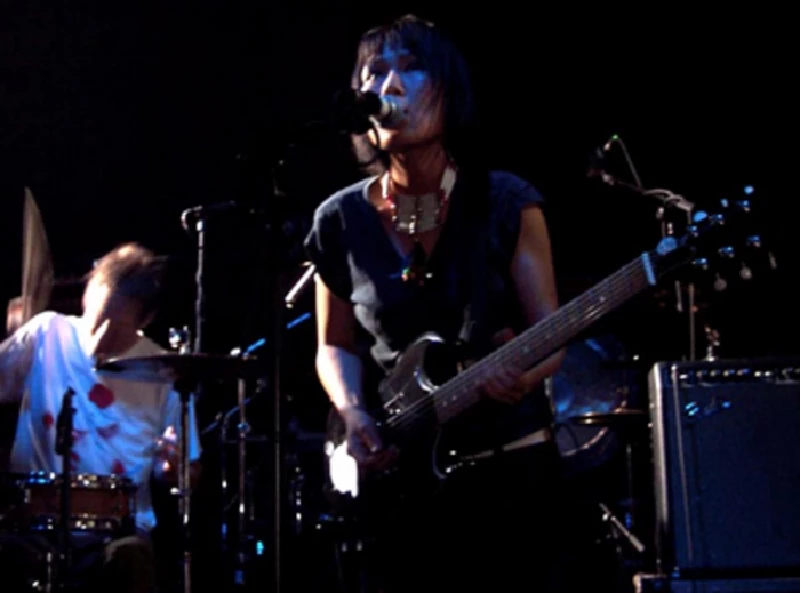
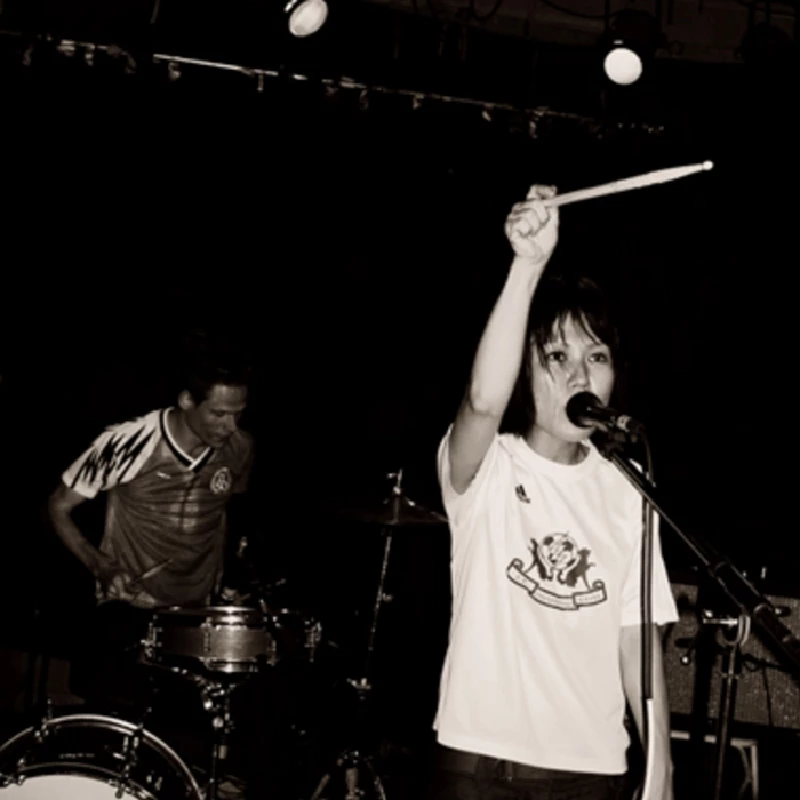
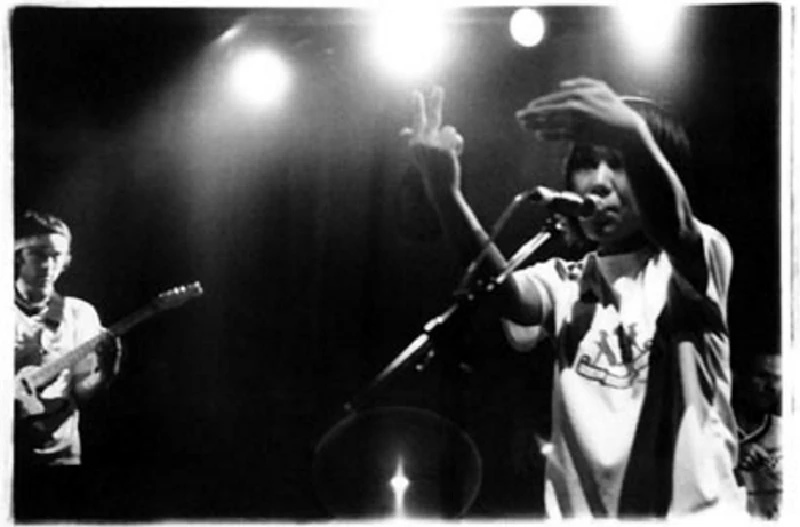
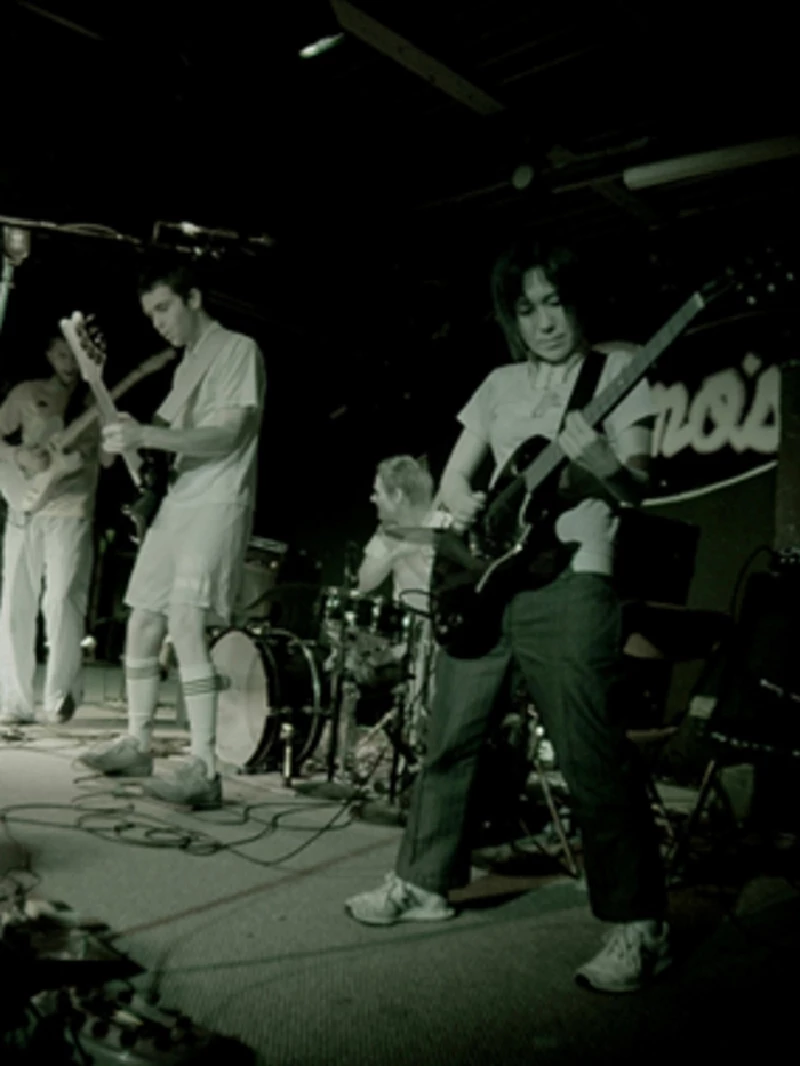
live reviews |
|
Garage, London, 12/10/2005 |

|
| A recent All Tomorrow's Parties package tour featured experimental rockers Deerhof, the Drones and Alexander Tucker. Dominic Simpson watches them all three acts play to a sweltering London Garage with decidedly mixed results |
most viewed articles
current edition
Carl Ewens - David Bowie 1964 to 1982 On Track: Every Album, Every SongArmory Show - Interview with Richard Jobson
John McKay - Interview
Colin Blunstone - Thalia Hall, Chicago, 16/7/2025
Billie Eilish - O2 Arena, London, 10/7/2025
Bathers - Photoscapes 1
Visor Fest - Valencia, Spain, 26/9/2025...27/9/2025
Loft - Interview
Sir Tim Rice - Interview
Robert Forster - Interview
previous editions
Manic Street Preachers - (Gig of a Lifetime) Millennium Stadium, Cardiff, December 1999Heavenly - P.U.N.K. Girl EP
Beautiful South - Ten Songs That Made Me Love...
Oasis - Oasis, Earl's Court, London, 1995
Peter Perrett - In Dreams Begin Responsibilities Interview Part One
Boomtown Rats - Ten Songs That Made Me Love....
Coldplay - Wembley Arena. London, 16/8/2022
Prolapse - Interview
Pixies - Ten Songs That Made Me Love...
Trudie Myerscough-Harris - Interview
most viewed reviews
current edition
Davey Woodward - Mumbo in the JumboSick Man of Europe - The Sick Man of Europe
Lucy Spraggan - Other Sides of the Moon
Amy Macdonald - Is This What You've Been Waiting For?
Phew, Erika Kobayashi,, Dieter Moebius - Radium Girls
Bush - I Beat Loneliness
Suzanne Vega - Flying With Angels
Alice Cooper - The Revenge of Alice Cooper
Cynthia Erivo - I Forgive You
Blueboy - 2
Pennyblackmusic Regular Contributors
Adrian Janes
Amanda J. Window
Andrew Twambley
Anthony Dhanendran
Benjamin Howarth
Cila Warncke
Daniel Cressey
Darren Aston
Dastardly
Dave Goodwin
Denzil Watson
Dominic B. Simpson
Eoghan Lyng
Fiona Hutchings
Harry Sherriff
Helen Tipping
Jamie Rowland
John Clarkson
Julie Cruickshank
Kimberly Bright
Lisa Torem
Maarten Schiethart